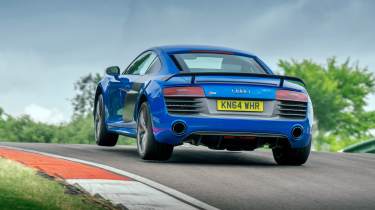Audi Sport: innovations at Le Mans
We trace how Audi Sport conquered Le Mans and used track-based technology to develop some of its most iconic road cars

As the new millennium dawned, Audi Sport embarked upon its latest new challenge. It had achieved unprecedented success in a variety of circuit-based disciplines, but now the biggest prize of all beckoned: the Le Mans 24 hours. And like so much of its involvement in motorsport up to that point, transferring technology from the track to the road was once again at the epicentre of the firm’s objectives.
As has been the case with many legendary racing cars, the R8 project had a challenging birth that masked the true potential that lay beneath the surface. The original R8R made its 24 Hours of Le Mans debut in 1999 powered by an all-new twin-turbo 3.6-litre V8; Audi’s first purpose-built racing engine since the 1930s. The centrepiece of the engine was its use of direct fuel injection technology, which would soon be rolled out across Audi’s road cars.
On its debut the R8Rs finished third and fourth, yet the smart but rather conventional looking machine was only Audi’s opening salvo. The Audi Sport team had learnt a lot in a short space of time, and for 2000 developed an all-new chassis and the first evolution of its V8 motor. It was known simply as ‘R8’, and its slender, crisp, open-top bodywork would become synonymous with the race over the first half of the new decade, in no small part due to its dominance that resulted in five victories (in 2000, 2001, 2002, 2004 and 2005). In just a handful of years Audi had gone from inexperienced newcomer to the dominant force of sports car racing, on both sides of the Atlantic.

Road car buyers didn’t have to wait long for the fruits of this hard-won experience to make it into the showroom. Audi’s direct injection technology was soon to be found on its road car engines, with the new RS4’s 4.2-litre V8 featuring direct injection technology in 2006. Only 12 months later that same engine was fitted to Audi's all-new supercar that would once again transform Audi’s image: the R8.
Not to be confused with the racer, the mid-engined, all-aluminium, quattro R8 exceeded all expectations, offering sensational styling, a beautifully free-revving V8 and wonderfully resolved handling in an exotic package. Audi Sport was now a winner at the highest level of racing, and the R8 road car was the ideal showcase for this prowess on the road. Even today, its silky V8 and brilliantly tactile gated manual gearbox offer an experience that epitomises the evo magazine doctrine.
However, rather than rest on its laurels, Audi Sport responded to the competition on track in the most radical of ways imaginable: it introduced a diesel-powered sports racing car. In creating the R10, with its immense, 5.5-litre, twin-turbo V12, it introduced a world first - the first purpose-built diesel racing engine. Audi had long been a proponent of diesel technology, something that stemmed from Ferdinand Piech himself, and the Le Mans programme was seen as a way of furthering Audi’s expertise and promoting TDI technology to new markets, such as the USA. Already in Europe, one in every two Audi’s sold featured a TDI engine.
The R10 Spyder made 650bhp and over 800lb ft of torque. It was truly a monster, only to be tamed by the best drivers in the sport, which Audi certainly had in the likes of Tom Kristensen and Allan McNish, amongst others. The R10’s hat trick of wins (2006, 2007 and 2008) is testament to the engineering talent of the Audi Sport team, who designed a racing diesel so clean that the insides of the exhausts could be wiped with a white cloth after 24 hours of racing and impart no sooty residue whatsoever.

The R15 followed the R10, with a 5.5-litre V10, and notched up another Le Mans victory in 2010, before making way for the first of Audi Sport’s Le Mans coupes , the R18. Now powered by a much smaller and highly efficient V6 turbodiesel, the R18 duly took a Le Mans win in 2011. Updated for 2012 with the Ultra version, this model introduced E-Tron quattro technology with an electrified front axle, and it was this racer that secured another 24 Hours of Le Mans hat trick in 2012, 2013 and 2014, showcasing Audi’s involvement with hybrid powertrains.
It was in the last of those races that Audi introduced yet another new piece of technology to help its star racing drivers. New laser headlight technology made a huge difference to night time visibility - always such a dangerous part of the race, particularly in traffic at Le Mans. And true to its mission to promote technological transfer, laser lights made their road car debut that same year with the launch of the Audi R8 V10 LMX. With quattro four-wheel drive, a powerful and unbreakable V10 engine, and its laser light technology, this stunning 562bhp supercar was the road-going embodiment of how far Audi Sport had conquered the world’s race circuits over the past 15 years.

